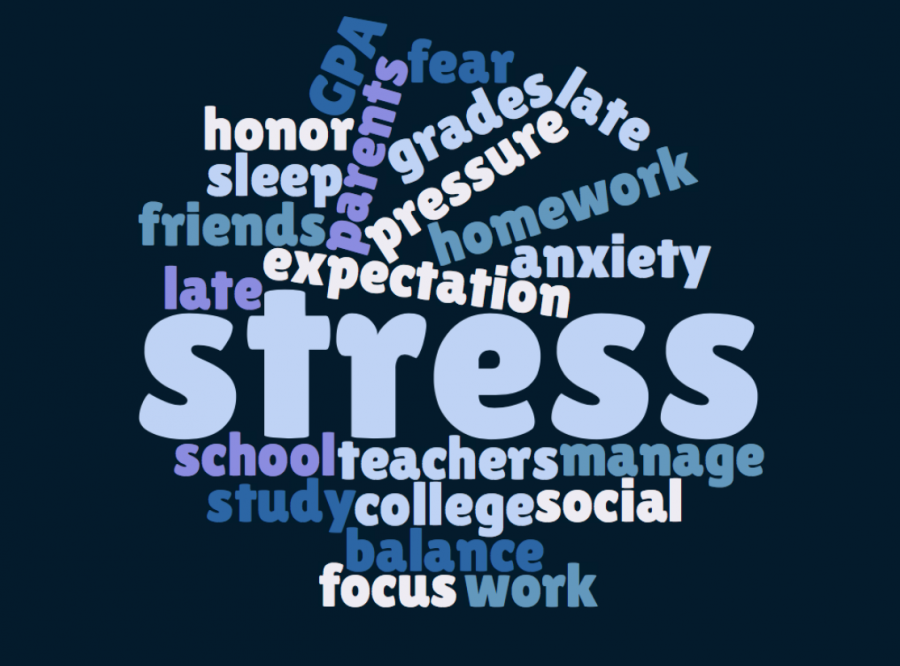An Open Letter to Stress
The situations and pressures that create panic in each of us are commonly referred to as ‘stressors’ as depicted above.
November 16, 2017
Dear Stress,
No longer are we scared of dark corners or hidden figures. Instead, we are fearful of our encounters with you. Your existence has become a cornerstone of our lives. When we come to school and attempt to learn in a ‘relaxed atmosphere’, we are inundated with stressful exams and assignments. In addition to our responsibilities at school, we must also balance our extracurricular activities and social life in an attempt to sleep for the recommended 8 hours!
According to apa.org, “Thirty-one percent of teens say that their stress level has increased in the past year and 34 percent believe their stress levels will increase in the coming year. Eighty-three percent report that school is a somewhat or significant source of stress and 10 percent of teens report receiving lowers grades than they are capable of because of stress.” These types of numbers are indicative of an epidemic that isn’t sustainable. 83% of students say they spend 8 or more hours in a high-stress atmosphere. Even our sleep is impacted by stressful expectations during the day.
Our sleep determines our performance the following day in school. Pediatricians recommend receiving 8 to 10 hours of sleep, especially during developmentally significant periods. How can worksheets and assignments be done when we are barely rested enough to climb out of bed to go to school? Each day we return home and intently watch the clock as hours waste away. Before we even realize it, midnight has arrived and we have succeeded in completing little of what was assigned. School days allow no time for exercise, sleep, or personal activities. Sometimes, we are so exhausted that we can barely keep our eyes open, and other times you make us lay awake at night filled with angst.
You push us well beyond our limits. As if that wasn’t hard enough, high expectations from parents and teachers make it even more difficult. We are pressured consistently to get good grades and to soar to the top of our class. At the same time, parents encourage us to ignore the stress in order to complete our work, which is easier said than done. All of these culminating stress factors can push some students over the edge. According to apa.org “Many teens report feeling overwhelmed (31 percent) and depressed or sad (30 percent) as a result of stress. More than one-third of teens report fatigue or feeling tired (36 percent) and nearly one-quarter of teens (23 percent) report skipping a meal due to stress.
Today, our society demands that individuals be their best self while accomplishing a great deal, but we can only achieve this aim if we are healthy both mentally and physically. Many teens battle stress but more needs to be done to reduce our stress; in order to win this fight, we need to begin by recognizing what we are losing as a result of our submission to unattainable standards. The stress of the high school environment is compounded by the anxiety of planning one’s future. As students, we are repeatedly interrupted by extraneous assignments that have far less significance to life than college planning.
In an article written for The New York Times by journalist Tara Parker-Pope, the author interviews Dr. Kenneth Ginsburg, an “adolescent medicine specialist at Children’s Hospital of Philadelphia and author of books on teenage stress and resiliency for the American Academy of Pediatrics”. He says, “The college admissions process is an initiation rite into adulthood. But if success is defined very narrowly, such as a fat envelope from a specific college, then many kids end up going through it and feeling like a failure.”
We propose the alternative. We shouldn’t treat school as a qualitative measure of student successes or failures, but we should utilize it as a platform to truly teach people. Looking at schools in other parts of the world, homework is minimal, stress is limited and they outperform our schooling system. Finding a solution to the epidemic of school stress will require a considerable shift from our current curriculum, but it is possible. We should invest in the wellness, happiness, and efficiency of our students.
Sincerely,
The Bird Feed Staff





